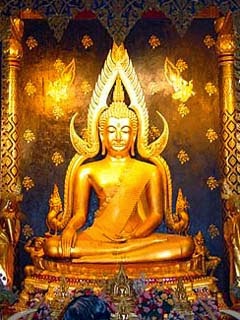Qualities of the Dhamma
|
From the Anguttara Nikaya…
The Anguttara Nikaya is one of the five major collections of the discourses section of the Pali Canon, which is the Buddhist scriptures. Anguttara Nikaya is translated as "Numerical Discourses" and includes most of the lists of the Buddha. The Complete Book of Buddha's Lists -- Explained draws primarily from this section of the Buddha's teachings. It is effectively a good summary of the Buddha's teachings due to the many lists which are presented and explained in the Anguttara Nikaya. If you read only one section of the Buddhist scriptures, the best one to read or start with is the Anguttara Nikaya. In addition, some of the best and most profound Buddhist teachings can be found in the Anguttara Nikaya. Here are just a few important passages:
Anguttara Nikaya 4.21 The Buddha's Refuge:
After enlightenment the Buddha said, "Let me then honor and respect and dwell in dependence on this very Dhamma to which I have fully awakened."
Anguttara Nikaya 11.12 The Six qualities of the Dhamma:
Anguttara Nikaya 3.65 The Kalama Sutta, The Buddha's Charter of Free Inquiry:
"Do not believe in something because it is reported. Do not believe in something because it has been practiced by generations or becomes a tradition or part of a culture. Do not believe in something because a scripture says it is so. Do not believe in something believing a god has inspired it. Do not believe in something a teacher tells you to. Do not believe in something because the authorities say it is so. Do not believe in hearsay, rumor, speculative opinion, public opinion, or mere acceptance to logic and inference alone. Help yourself, accept as completely true only that which is praised by the wise and which you test for yourself and know to be good for yourself and others."
Anguttara Nikaya 3.65 Metta and the Brahma Viharas; loving kindness and the divine emotions:
"Now, Kalamas, one who is a disciple of the noble ones - thus devoid of greed, devoid of ill will, undeluded, alert, and resolute - keeps pervading the first direction [the east] - as well as the second direction, the third, and the fourth - with an awareness imbued with good will. Thus he keeps pervading above, below, and all around, everywhere and in every respect the all-encompassing cosmos with an awareness imbued with good will: abundant, expansive, immeasurable, free from hostility, free from ill will.
He keeps pervading the first direction - as well as the second direction, the third, and the fourth - with an awareness imbued with compassion. Thus he keeps pervading above, below, and all around, everywhere and in every respect the all-encompassing cosmos with an awareness imbued with compassion: abundant, expansive, immeasurable, free from hostility, free from ill will.
He keeps pervading the first direction - as well as the second direction, the third, and the fourth - with an awareness imbued with appreciation. Thus he keeps pervading above, below, and all around, everywhere and in every respect the all-encompassing cosmos with an awareness imbued with appreciation: abundant, expansive, immeasurable, free from hostility, free from ill will.
He keeps pervading the first direction - as well as the second direction, the third, and the fourth - with an awareness imbued with equanimity. Thus he keeps pervading above, below, and all around, everywhere and in every respect the all-encompassing cosmos with an awareness imbued with equanimity: abundant, expansive, immeasurable, free from hostility, free from ill will."
For Vegetarian Buddhists there is Anguttara Nikaya 3:16:
"Monks, one possessed of three qualities is put into Purgatory according to his actions. What three? One is himself a taker of life, encourages another to do the same and approves thereof.
Monks, one possessed of three qualities is put into heaven according to his actions. What three? He himself abstains from taking life, encourages another to so abstain, and approves of such abstention Anguttara Nikaya 3.16. . . . (and speaks in praise of thereof . . ." added to this list in Anguttara Nikaya 10. 213)
Anguttara Nikaya 5.177 The five types of wrong livelihood:
"Monks, a lay follower should not engage in five types of business. Which five? Business in weapons, business in human beings, business in meat, business in intoxicants, and business in poison."
Anguttara Nikaya 3.61 The Four Noble Truths:
Suffering, the cause of suffering, the way suffering ceases, and the Middle Path
Anguttara Nikaya 3.62 The Noble Eightfold Middle Path:
Right: Understanding, Thought, Speech, Action, Livelihood, Effort, Mindfulness, Concentration
Anguttara Nikaya 10.13 The ten hindrances to enlightenment:
The belief in a permanent personality /ego; Doubt, extreme skepticism; Clinging to rites, rituals, ceremonies; Attachment to sense desires; Ill-will / anger; Craving for form world; Craving for formless world; Conceit; Restlessness; Ignorance.
Anguttara Nikaya 4.241-243 Anyone from any religion can get to heaven:
"Another person has practiced the making of merit by giving as well as by moral discipline to a high degree; but he has not undertaken the making of merit by meditation. With the breakup of the body, after death, he will be reborn among humans in a favorable condition. Or he will be reborn in the company of the devas of the Four Great Kings."
Anguttara Nikaya 2.25 The Dhamma is not just a fundamentalist teaching:
"Monks, these two slander the Tathagata [Buddha]. Which two? He who explains a discourse whose meaning needs to be inferred as one whose meaning has already been fully drawn out. And he who explains a discourse whose meaning has already been fully drawn out as one whose meaning needs to be inferred. These are two who slander the Tathagata."
|



